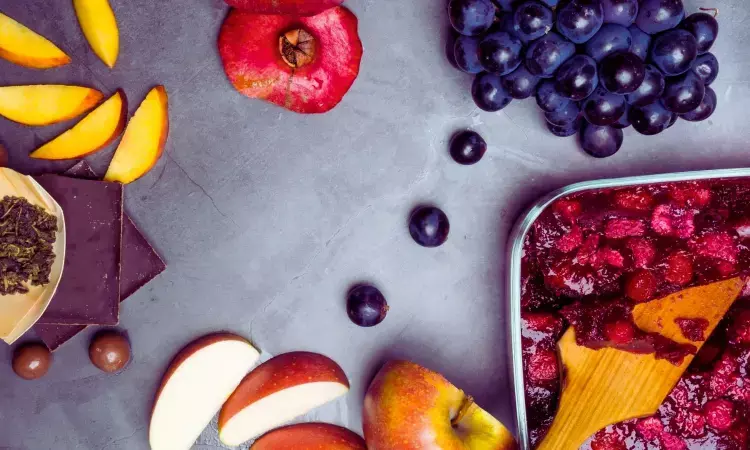- Home
- Medical news & Guidelines
- Anesthesiology
- Cardiology and CTVS
- Critical Care
- Dentistry
- Dermatology
- Diabetes and Endocrinology
- ENT
- Gastroenterology
- Medicine
- Nephrology
- Neurology
- Obstretics-Gynaecology
- Oncology
- Ophthalmology
- Orthopaedics
- Pediatrics-Neonatology
- Psychiatry
- Pulmonology
- Radiology
- Surgery
- Urology
- Laboratory Medicine
- Diet
- Nursing
- Paramedical
- Physiotherapy
- Health news
- Fact Check
- Bone Health Fact Check
- Brain Health Fact Check
- Cancer Related Fact Check
- Child Care Fact Check
- Dental and oral health fact check
- Diabetes and metabolic health fact check
- Diet and Nutrition Fact Check
- Eye and ENT Care Fact Check
- Fitness fact check
- Gut health fact check
- Heart health fact check
- Kidney health fact check
- Medical education fact check
- Men's health fact check
- Respiratory fact check
- Skin and hair care fact check
- Vaccine and Immunization fact check
- Women's health fact check
- AYUSH
- State News
- Andaman and Nicobar Islands
- Andhra Pradesh
- Arunachal Pradesh
- Assam
- Bihar
- Chandigarh
- Chattisgarh
- Dadra and Nagar Haveli
- Daman and Diu
- Delhi
- Goa
- Gujarat
- Haryana
- Himachal Pradesh
- Jammu & Kashmir
- Jharkhand
- Karnataka
- Kerala
- Ladakh
- Lakshadweep
- Madhya Pradesh
- Maharashtra
- Manipur
- Meghalaya
- Mizoram
- Nagaland
- Odisha
- Puducherry
- Punjab
- Rajasthan
- Sikkim
- Tamil Nadu
- Telangana
- Tripura
- Uttar Pradesh
- Uttrakhand
- West Bengal
- Medical Education
- Industry
Higher Flavonoid Intake Linked to Lower Risk of Nocturia in Middle-Aged and Older Adults: Study Finds

China: A recent study analyzing data from the National Health and Nutrition Examination Survey (NHANES) 2007-2010 suggests that higher dietary flavonoid intake may be linked to a lower likelihood of nocturia in middle-aged and older adults.
"The analysis demonstrated a notable inverse association (OR: 0.93), with anthocyanins, flavan-3-ols, and flavonols—particularly peonidin, quercetin, and catechin—emerging as key contributors. These findings emphasize the potential role of flavonoid-rich diets in managing nocturia and promoting better urinary health," the researchers wrote in Scientific Reports.
Nocturia, a chronic condition that significantly impacts quality of life, is increasingly prevalent, affecting over 50% of older adults in the U.S. Prior research suggests that inflammation and oxidative stress may contribute to its development. Given their well-documented anti-inflammatory, antioxidant, and anti-aging properties, flavonoids have garnered considerable attention in health research. However, their potential role in nocturia remains largely unexplored.
To address this gap, De-Liang Liu, Department of Endocrinology, Shenzhen Traditional Chinese Medicine Hospital, Shenzhen, Guangdong, China, and colleagues conducted a cross-sectional analysis using comprehensive data from the 2007–2010 NHANES to examine the relationship between dietary flavonoid intake and nocturia. The findings could offer valuable insights into dietary strategies for managing and preventing nocturia in middle-aged and older adults.
For this purpose, the researchers conducted a cross-sectional study involving 5,926 middle-aged and older adults aged 40 and above. Daily dietary flavonoid intake was assessed using two 24-hour dietary recall interviews, while nocturia was evaluated through a standardized questionnaire administered by trained interviewers.
Further analysis included weighted logistic regression and weighted quantile sum (WQS) regression to assess the combined effects of six flavonoid subclasses— isoflavones, anthocyanins, flavan-3-ols, flavanones, flavones, and flavonols—while also identifying the contribution of each component. Subgroup analysis helped detect heterogeneity in these associations, enhancing the relevance and applicability of the findings across different population groups.
Key Findings:
- After adjusting for confounders, weighted logistic regression analysis revealed a significant association between higher dietary flavonoid intake and a lower prevalence of nocturia (OR: 0.93).
- This association remained significant when analyzed across quartiles of flavonoid intake.
- RCS analysis indicated an inverse linear relationship between total flavonoid consumption and nocturia.
- Quartile stratification and WQS regression identified anthocyanins, flavan-3-ols, and flavonols as key contributors to this protective effect.
- Among these subclasses, Peonidin (anthocyanins), Catechin and Theaflavin-3,3’-digallate (flavan-3-ols), and Isorhamnetin, Kaempferol, and Quercetin (flavonols) were potentially significant contributors.
The findings highlight an inverse association between dietary flavonoid intake and nocturia in middle-aged and older adults, with anthocyanins, flavan-3-ols, and flavonols showing a protective effect.
"Further clinical and experimental research is needed to investigate the underlying mechanisms and validate the role of flavonoids in human metabolism related to nocturia," the researchers concluded.
Reference:
Cai, Y., Liang, Y., Hu, X., Li, L., Liu, D., Chu, S., & Li, H. (2025). Inverse association between dietary flavonoid intake and nocturia in middle-aged and older adults from NHANES 2007–2010. Scientific Reports, 15(1), 1-13. https://doi.org/10.1038/s41598-025-88681-2
Dr Kamal Kant Kohli-MBBS, DTCD- a chest specialist with more than 30 years of practice and a flair for writing clinical articles, Dr Kamal Kant Kohli joined Medical Dialogues as a Chief Editor of Medical News. Besides writing articles, as an editor, he proofreads and verifies all the medical content published on Medical Dialogues including those coming from journals, studies,medical conferences,guidelines etc. Email: drkohli@medicaldialogues.in. Contact no. 011-43720751


